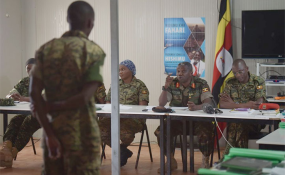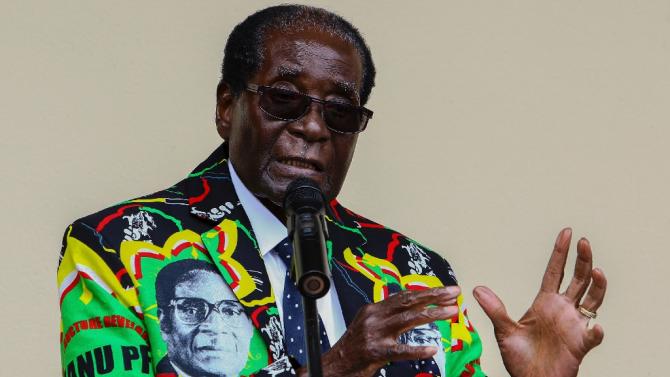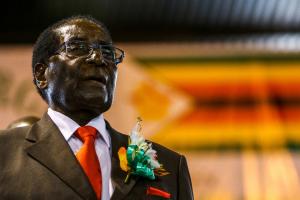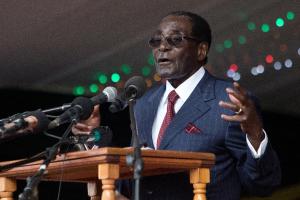This report, commissioned by the Dutch government, describes the activities of the Eritrean regime inside the Netherlands.
It looks at the Eritrean community in the country, describes Eritrean organisations and their activities, and how the government in Asmara exercises control through them.
The report was covered by the main Dutch newspaper, the Telegraph, as: ‘Cabinet wants to put a stop to the long arm of Eritrea.’
Martin
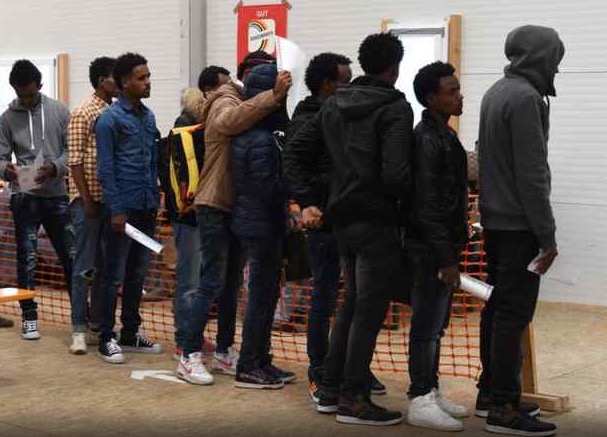 Unofficial translation of the summary of the report “Niets is wat het lijkt: Eritrese organisaties en integratie”
Unofficial translation of the summary of the report “Niets is wat het lijkt: Eritrese organisaties en integratie”
by the DSP-Groep Amsterdam and Tilburg University
Translated by Klara Smits
Summary and conclusions
The Eritrean community in the Netherlands has grown quickly and significantly over the past years and it has a long history and great diversity.
This research addresses the question of how the Eritrean community in the Netherlands is organized and to what extent outside pressure is experienced within the Eritrean community, especially from Eritrea itself. The goal of the research is to gain insight into:
- the network of Eritrean organisations in the Netherlands;
- the extent and the nature of the (foreign) control of Eritrean organizations in the Netherlands by the Eritrean government and/or organisations allied to the Eritrean government;
- the extent and the nature of the pressure that is experienced among Eritreans in the Netherlands, including the payment of financial contributions.
In this summary, the most important findings will be presented and conclusions will be drawn. The method in which the research questions have been examined can be read in chapter 1. The substantiation of the summary and conclusions can be found in chapters 2 to 5.
Reasons for this research
There are concerns over the integration of persons with an Eritrean background in the Netherlands. As the Eritrean community in the Netherlands is rapidly growing and following the reports in the media about intimidation, the House of Representatives (Tweede Kamer) requested a letter to the parliament and a debate in which Eritrea and the influence of Eritrea in the Netherlands could be discussed. The letter was sent to the House of Representatives on June 30th, 2016, by government officials from the ministries of Foreign Affairs, Social Affairs and Employment and Security and Justice, after which the debate followed. During the parliamentary debate about ‘Eritrea and the influence of Eritrea in the Netherlands’, concerns emerged from the House of Representatives that among others related to the financial contribution of the Netherlands to Eritrea, the diaspora tax, the role of the Eritrean embassy in The Hague in exerting undue pressure, the representatives of the regime in the Netherlands and the lagging integration of Eritreans in the Netherlands.
During the debate of 30 June, the Minister of Social Affairs and Employment pledged to have a study carried out among Eritreans in the Netherlands. DSP-groep has executed this research between 21 September and 1 November 2016.
To answer the research questions that emerged from the goals described above, literature research and document research have been executed, four focus group sessions have taken place and a total of 110 interviews were held: 22 with international experts, 21 with Dutch key informants of policy, welfare and support organisations, 6 with lawyers specialised in migration law and who are involved in cases of Eritreans and 61 with people from the Eritrean community of which 20 (former) (board members) from Eritrean organisations. A broad range of people from the Eritrean community has been interviewed, with the goal of incorporating a wide diversity in the research, considering age, gender, religion, political opinion and the timing of emigration to the Netherlands. Both supporters and opponents of the Eritrean regime were interviewed and the ambassador as well as representatives of the embassy were interviewed.
The Eritrean community in the Netherlands
It is estimated that currently 20.000 people with an Eritrean background currently live in the Netherlands. The exact number is hard to pinpoint, because people that were born in Eritrea before its independence in 1993 were officially born in Ethiopia and are often registered as Ethiopian.
The refugees from Eritrea have come to the Netherlands in roughly three waves. In the table below, the characteristics of these migration waves are summarised.
| Migration wave |
Migration context |
| First wave
(1980-1998)
Approx. 1.500 refugees
|
A: 1980-1991
Fleeing the independence war (members of the ELF and later of the EPLF; the predecessor of the PFDJ, the party of the current regime)
B. 1991-1998
Fleeing during the reconstruction of Eritrea due to various reasons
|
| Second wave
(1998-2010)
Approx. 6000 refugees
|
Since the border conflict with Ethiopia
Fleeing the current regime
|
| Third wave
(2010-current)
Approx. 14.0000 refugees
|
Fleeing the current regime |
THE Eritrean community does not exist. There are various religious groups, differences between the regions of origin (highlanders versus lowlanders, urban versus countryside) and different views on the current regime. The impression is kaleidoscopic, due the variety, but also because of the internal contradictions, A respondent may emphasise opposing the regime in Eritrea and wanting to integrate in the Netherlands as quickly as possible, but another respondent may subsequently swear up and down that the respondent in question – or the organisation that they represent – are actually of an entirely different opinion. Or perhaps one discovers that the representative is in fact not representing the organisation at all. The closer you look, the more it seems that sometimes, nothing is what it seems.
What is clear is that the community is highly polarised: staying neutral or apolitical is difficult. A lot of mistrust exists among people. There is also a lot of fear. Fear and mistrust form a toxic combination that hampers interaction within and outside of the community.
The third wave of refugees that has recently come to the Netherlands is creating changes in the relations. A lot of movement can be seen within the community, partly as a result of the recent reports by the United Nations, the court cases in the Netherlands and the recent coverage of Eritrea.
The description that is given in this report is a snapshot and a principally Dutch snapshot at that, even while the Eritrean community is essentially a transnational community. Refugees from Eritrea have spread across the diasporas of Europe, America, Africa and the Middle-East in the last few decennia. Families are divided between the diaspora and Eritrea. At the same time, the world has quickly diminished in size in the past years. Social media play an important role in maintaining contacts, both in informal contacts as well as in political relations (for supporters and opposition alike). The situation in the Netherlands cannot be seen as separate from the other diasporas nor the situation in Eritrea.
Below, the three main questions and the corresponding sub-questions of the research are answered.
- What does the network of Eritrean organisations in the Netherlands look like on an institutional level?
The level of organisation within the Eritrean community is high. A minimum of approximately sixty organisations are active in the Netherlands, organised by and for members of the Eritrean community (see table 1 in the report). They can roughly be sorted into
- Local organisations;
- Sport or recreational organisations;
- Political organisations or movements;
- Religious organisations;
- Organisations for specific (religious) groups in the community.
Many of the organisations are not registered at the chamber of commerce as foundation or organisation. Most of the organisations – with the exception of the political movements and organisations that are active in the entire diaspora – are aimed primarily at the local community. Besides these organisations, there are plenty of informal networks and initiatives for meetings and support. The creation and development of the organisations runs parallel to the three migration waves and the spread of the community across the Netherlands.
- Which goals do they have, which activities do they carry out, where are they active (in the geographical sense) and who are their members?
The first organisations – mainly local – have been founded by the first refugees and migrants in the large cities (Rotterdam, Amsterdam). They were especially aimed at the creation of connections and raising awareness of the struggle for independence in Eritrea. The focus was mainly on socio-cultural activities. This type of organisation has spread further across the Netherlands and followed the expansion of the community across the Netherlands in this. Later, these organisations started to focus on emancipation of their members, more specifically women. With the recent arrival of the large group of newcomers – refugees from the third migration wave – more initiatives and organisations have sprung up to support this new group of refugees. The activities are mainly aimed at providing information about the Netherlands, about bridging the cultural divide, and offering further support with Dutch language and communication, the building of networks in the Netherlands and the supplying of practical help. Some of these initiatives were taken by the older generations that have been here for a longer period of time and others were taken by the newcomers themselves – often in cooperation with Dutch volunteers.
Most of the organisations have members that pay a contribution and/or pay for taking part in activities. Many organisations receive local subsidies and/or organise fundraising. In addition, there are organisations – often more informal – that organise recreational activities and sports activities. They want to offer an opportunity for coming together through sports and recreation, in order to connect with the Dutch society.
The organisations are often strongly divided along political and religious lines and there are hardly, if any, organisations were polarised groups overlap or meet. In the political sense, the members of the Eritrean community are divided between supporters and opponents of the regime and they are also strongly divided along religious and ethno-religious lines. Supporters of the Eritrean regime associate themselves with the Dutch branch of the PFDJ, the governing party of Eritrea, and with the Youth-PFDJ.
The opposition operates globally and is connected to internationally organised groups that have the goal of improving the situation in Eritrea. Their most important activities are the documentation of human rights violations, the organisation of the opposition, the sharing and spreading of information, the organisation of meetings and demonstrations and advocating their case in politics (from the UN to the chamber of representatives).
Most of the Eritreans in the Netherlands are members of the Eritrean Orthodox church. Additionally, some are members of Protestant, Reformed and Catholic churches and some are members of the Pentecostal church or Jehovah’s Witnesses and others are Muslims. In the last few years, new churches have been formed partly due to the (alleged) infiltration of the Orthodox church by the regime in Eritrea. These opposition churches or neutral churches often work together with for example Dutch churches or Ethiopian Orthodox churches. Characteristic of the third wave of migration is that some of the refugees are highly religious. The members of smaller religious communities have their own communities and/or join the Dutch churches. In the case of a separate Eritrean religious community, this community is usually also in contact with Dutch churches. The Eritrean Muslims mostly join local mosques for their profession of faith. There are, however, a number of organisations specifically aimed at Eritrean Muslims. They provide activities similar to the local organisations.
- What (financial) ties to Eritrea, including the Eritrean government, exist and what is the nature of these ties?
The PFDJ is the government party, the only political party that is allowed within Eritrea. The PFDJ is supported by a number of ‘mass organisations’, the National Union of Eritrean Women (NUEW) and the National Union of Youth (NUEY) and Students (NUES/NUEYS). The Youth PFDJ or YPFDJ Holland is a part of the international youth movement that has been founded by the political leader of the PFDJ in Asmara. It is the most active ad visible organisation of the PFDJ. Eri-Blood is the strong-arm squad of the PFDJ.
All of these organisations are under the authority of the PFDJ. They have the explicit political goal to strengthen the PFDJ and to control what happens within the diaspora. The embassy, as official representation of Asmara, is under the control of the PFDJ.
The first local organisations were founded by refugees from the first migration wave that asked for support for the independence struggle. After independence, they have staid – especially in the beginning – loyal to the principles of the PFDJ (the current regime). The majority of local organisations officially claims to be neutral and apolitical, to be open to all Eritreans, to not mix in politics and not to have contacts with the embassy or the regime. Other respondents strongly doubt these claims.
There are strong indications that a large number of these organisations have been infiltrated or taken over by the PFDJ in the past years. Many board members or active members of these organisations profile themselves as active PFDJ or YPFDJ members and/or pursue the goals of the PFDJ openly. The embassy and the PFDJ, which operates from within the embassy, plays an important role in the monitoring or direct management of the organisations, according to many respondents. The embassy itself denies this and argues that it offers support.
Those that have developed new initiatives have all experienced, to a certain extent, warnings, threats, intimidation and attempts to infiltrate or take over. For some of these organisations, these attempts have succeeded, while others have stopped and others have stayed neutral. Some have actively jjoined the opposition and have broken all ties.
In Eritrea, the Orthodox church falls under the authority of the PFDJ and according to many respondents, this is equally the case in the Netherlands. Official churches are managed from within Eritrea and operated by priests that have been educated there. Among the churches that are part of the Eritrean Orthodox church under the authority of the PFDJ are the churches in Rotterdam, Amstelveen, Leiden, Utrecht, Alkmaar and Eindhoven. Besides these, there are other locations of which some are recent and still informal in character.
An important task of the PFDJ – and the organisations, movements and churches allied to the PFDJ – is the collection of finance in the form of taxes or other translations (the 2% diaspora tax, contributions, donations, etc.).
The collection is organised mainly through gatherings, large parties, festivals and concerts. Very large amounts are involved and the pressure to meet these large amounts is being increased substantially.
A former minister of Finance of Eritrea and former leaders of the YPFDJ in Europe and the Netherlands assert that the collection of finances is one of the most important goals of the organisations in the diaspora. The total amount of revenues includes, alongside the contribution of members, the subsidies that the organisations in question receive. The management of the finances of the YPFDJ is executed by the embassy, led by the head of the political department of the PFDJ in Eritrea.
- What are the relations among the organisations and movements; management, cooperation and influence, also from within Eritrea?
The various organisations do not cooperate substantially. The cooperation is being hampered by the strong mistrust within the community. People always bear in mind the possible affinity towards the regime and potential infiltration of supporters.
The supporters of the regime are well organised within the diaspora and try to exert influence over the local communities. YPFDJ plays an important role in this. The supporters of the regime respond quickly, explicitly and fiercely to any criticism and opposition.
The opposition is more fragmented in its organisation than the supporters of the regime. The various opposition movements do work together, for example in the organisation of demonstrations. Recently, the opposition in the Netherlands has started to form a collective organisation in order to form a platform and a point of contact. Beyond its political goals, this platform wants to form a meeting place for members of the opposition through socio-cultural activities (as a counterpart to the parties of the YPFDJ) and to support new arrivals.
Individuals that form initiatives specifically aimed at support and assistance to the third migration wave, without a political message, experience disruption by the strong politicisation.
- What is the influence of these ties on the community in the Netherlands?
The entire network of organisations is in constant motion. Refugees from the third migration wave found their own organisations, partly because they fear the influence of the regime within existing organisations. Within the Orthodox church, groups split off to found their own churches – independent from the regime. Other churches within the Netherlands are being reached out to. Many of our respondents are under the impression that the influence of the PFDJ and YPFDJ is somewhat reduced by the large number of newcomers that have come to the Netherlands recently, in the third migration wave. Nevertheless, the entire situation in the Eritrean community remains strongly politicised: neutral does not exist. According to the regime and its supporters, neutral means ‘against Eritrea’ and according to the opposition, neutral means ‘pro-PFDJ’. There is, however, a large silent group: they are afraid, keep their mouths shut and do not want to stand out. The refugees from the third migration wave often feel misunderstood by the refugees from the first wave. They often mistrust the first migration wave. A part of the third migration wave has the tendency, for various reasons, to withdraw within their own group. However, initiatives where Dutch volunteers and care workers cooperate with refugees and counsellors that have lived in the Netherlands for a longer period of time, such as cultural mediators, show positive developments.
- What is the vision of the organisations and movements regarding their role in socio-cultural and socio-economic integration of Eritreans in the Netherlands?
- What is the vision of these movements and organisations on the integration in Dutch society?
All organisations and respondents view education and learning the Dutch language as a precondition to integration. Additionally, the supports of the regime see maintaining of good ties with Eritrea as important. As a refugee, you are responsible for contributing to Eritrea. This also explains why the supports are not involved much with the newcomers. They are being seen as traitors to the country.
One the one hand, organisations of the opposition try to achieve political change in Eritrea and on the other hand, they want to help newcomers settle down in the Netherlands. They offer concrete help (building trust, mediation, language and communication, and information about the Netherlands (the civil rights according to participation policy). According to them, this is unrelated to their opposition activities. Members of the community that do not want to voice a political opinion – for example out of fear for the consequences to their family in Eritrea – often do not want to be associated with the opposition. Organisations that are neutral are aimed at activities that promote integration, as mentioned above. They do not want to associate this with politics.
- How do the organisations advance socio-cultural and socio-economic integration and participation?
This sub-question was partly covered above. Although the majority of local organisations indicated that they want to advance integration with their activities, we can ask ourselves whether, and in how far, the activities for mainly their own Eritrean community (bonding) contribute to integration (binding). However, we have also encountered several activities that are aimed more at the Dutch society. This mostly concerns activities such as learning the Dutch language, practical skills, support and concrete help that do promote integration.
- Which concerns exist with regard to integration and participation of the members and especially the integration and participation of the younger generation and how is this being handled?
With regard to the first migration wave, the responses of the respondents mainly point at concerns about women and the less educated. Their command of Dutch is often poor and they are often dependent on social welfare payments. This group is sensitive to pressure and intimidation, is afraid and stays silent due to fear and mistrust.
The children of this first wave of refugees – the second generation – often do well in the area of integration. There is a group, however, that despite good education is experiencing problems on the job market and deal with racism and discrimination. This is the group that is receptive to recruitment by the YPFDJ.
The situation of the second migration wave is comparable to the first.
It is the third migration wave that is the main source of concern for everyone. These concerns relate to mistrust, the enormous cultural gap, the low level of education and the immense trauma: trauma sustained in Eritrea, trauma en route and trauma related to family left behind. Furthermore, a lot of pressure comes from financial burdens. This includes pressure from the Dutch society, for example to obtain the correct papers, but also financial pressure to somehow pay one’s own escape journey and/or those of others. This group has been confronted with human trafficking of near relatives, spouses and children, the extortions that follow and the insecurity that these situations cause.
Severe forms of trauma (including sexual trauma) form a serious obstacle for integration and participation. The symptoms of trauma can manifest in many different ways. Sometimes, this can lead to the use of extremely traditional religious customs that are often poorly understood and recognised in the Netherlands. The refugees have little faith in discussing trauma and rely upon traditional structures such as the Orthodox churches.
On the other hand, this group is also characterised by a strong motivation to learn the Dutch language and start working. This differs from the first migration wave in which most refugees invested little time in integration and participation early on, as they assumed that they would ‘be going back to Eritrea soon anyway’.
- What are the experiences and opinions of Eritreans about the pressure from the Eritrean community and the diaspora tax?
- Do they experience pressure (deliberately or otherwise) or do they feel intimidated and/or threatened in the Netherlands, and if yes, what is the nature (political, religious, etc.) and the extent of this pressure?
We have already commented on it: a lot of fear and mistrust exist within the community. The majority of the community experiences pressure. The pressure that is experienced is a sliding scale, which varies from implicit and subtle to explicit and in the form of threats and violence. It resembles a pyramid-shape. On the lowest level, many members of the community experience some pressure and a small part of the community personally experiences the most severe forms of intimidation.
The pressure, however, is not only determined by personal experiences, but clearly also by the information circulating in the community about intimidation. The trust in the rule of law, as we know it in the Netherlands, is being undermined by fear for reprisals, even if one has not experienced such reprisals directly.
The majority of the respondents was dealing with the implicit and subtle forms of pressure. People keep their mouths shut and/or pay taxes in order to prevent something happening to their family in Eritrea (‘what if…’). The reason this subtle pressure works depends on the more explicit forms of pressure. This is where pressure becomes intimidation. Again, this can range from lighter forms to more severe intimidations and threats. This report covers this pressure – from light to severe – extensively.
This research shows that despite the barriers caused by this fear, notifications and reports of crimes are being filed. Notifications and police reports are related to (1) assault; (2) rape; (3) disappearances; (4) (reported) suicide; (5) extortion in relation to human smuggling and trafficking; (6) extortion n relation to payment of the diaspora tax and other ‘voluntary’ contributions, and (7) intimidation.
The pressure and intimidation is therefore considered by us as a proven and established fact. In combination with:
- the normal migration and integration issues (different language, culture, climate, surroundings),
- the enormous amounts of trauma with many – if not most – migrants from the third wave, and
- the lack of understanding and mistrust between the migration waves and between generations
this pressure and intimidation leads to serious integration issues.
- What opinion do they have on the diaspora tax, how is it collected and what is the role of different bodies and organisations in this?
The embassy sees the tax as a voluntary contribution of 2% that is being sought without any pressure or coercion, in order to support the needs of the victims of the 30-year long struggle for independence (widows, orphans and war invalids).
However, we can raise question marks around the voluntary nature.
- Firstly, the tax must be paid if one wants to make use of consular services.
- Secondly, the payments must be made for a variety of affairs related to the situation and the family in Eritrea (for example a funeral of close relatives).
- Thirdly, ‘voluntary’ is a fairly relative term within the context of a climate of fear, mistrust and intimidation.
The diaspora tax and financial contributions rather seem to be part of a system of fear and intimidation.
It is notable that the tax plays a lesser role for the third migration wave, because this group is not required to use the services of the embassy for their procedure. However, many problems do arise for situations of family reunion. An early detection of circumstances is of vital importance here.
The following is also of consideration for the diaspora tax and other contributions:
- there is abuse of power by use of extortion, because the provision of consular services is being made contingent on payment for other purposes; this is in contravention to the Vienna Convention on Consular Relations;
- the purposes of the collection of finances – even if it is marked as a voluntary contribution at the parties – are not specific and the realisation of the goals is not knowable;
- collection is aimed at specific services (one goal is for example building houses, but thus far, no houses have been built with the money that was collected), or the money is being used for completely different unknown goals.
- there is no insight into the question to what extent the reconstruction of Eritrea is being reached through the use of the collected finances, due to the lack of public financial management (there is no budget, no treasury, no independent central bank).
For these same reasons, it cannot be known if and how these contributions can be used for possible military goals in the region, nor prevented can the use of contributions for military goals be prevented. This conclusion was recently drawn again by the UN Monitoring Group and it is in contravention to the weapons embargo that was placed on Eritrea by the UN Security Council.
Source=https://martinplaut.wordpress.com/2016/12/16/eritrea-evidence-of-shoot-to-kill-policy-as-group-gunned-down/





